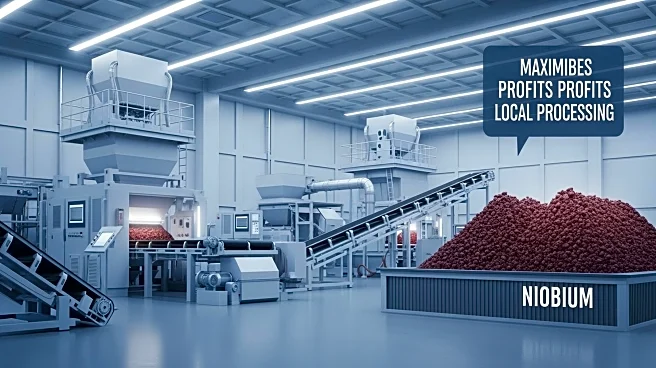What's Happening?
Brazil holds the largest known reserves of niobium and leads global production, yet struggles to capitalize on its potential due to limited local processing capabilities. Despite dominating the market, Brazil captures only a small portion of the value
generated from niobium, as most profits are tied to the mining stage rather than industrial transformation. Niobium is strategic for its applications in high-strength steels and special alloys, but the country's industrial policies have not fully leveraged these opportunities. The lack of a long-term plan for industrialization means Brazil misses out on billions in potential profits, as the transformation of niobium into high-value products progresses slowly.
Why It's Important?
The situation highlights a significant economic opportunity for Brazil to enhance its industrial capabilities and increase its share of the global niobium market. By advancing local processing, Brazil could diversify its export agenda, reduce vulnerabilities associated with commodity markets, and create more skilled jobs. The current reliance on mining revenue limits the country's ability to benefit from higher tax revenues and productivity gains linked to advanced sectors. A national strategy focusing on innovation, partnerships, and regulatory predictability could help Brazil climb the technological ladder and capture more value from its niobium reserves.
What's Next?
To unlock the full potential of its niobium reserves, Brazil needs to implement a comprehensive industrial policy that aligns public and private sectors around clear goals. This includes fostering partnerships between universities, research institutes, and companies to accelerate technological diffusion and process standardization. Additionally, Brazil must address challenges such as high transformation costs and the need for competitive energy and logistics infrastructure. By stimulating domestic demand for niobium applications, Brazil can justify the establishment of industrial plants and consolidate local supply chains.
Beyond the Headlines
The push for local processing of niobium also requires attention to socio-environmental criteria, ensuring efficient licensing and good waste management practices. By adhering to high environmental and social standards, Brazil can expand access to demanding markets and reduce reputational risks, facilitating financing and partnerships. The strategic potential of Brazilian niobium lies in aligning geological leadership with an industrialization project that adds value, generates knowledge, and captures greater revenue per exported product.















